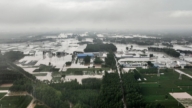【新唐人2013年08月17日訊】最近有海外媒體指出,相對中國製造業增長放緩或者房地產價格泡沫化等經濟危機來說,中國面臨的最大危機是水危機,並且這種危機正在影響亞洲其他國家,甚至波及世界。那麼,到底中國的水危機有多嚴重,是怎樣造成的,為甚麼水危機和經濟危機能扯到一起,我們來看看專家分析。
來自道鐘斯公司的這篇文章,美國《華爾街日報》在7月最後一天發表了。文章引用美國外交關係協會亞洲部門負責人伊科諾米(Elizabeth Economy),上週向美國參議院發表的證詞說,中國正面臨水危機,這種危機可能會在中國引發健康危機,並使中國與鄰國產生直接衝突。
文章認為,工業是水危機的罪魁禍首。中國工業的單位GDP用水量是同類經濟體的4到10倍,而且工業正在以令人擔憂的速度污染著中國的現有水資源。
中國地質調查局2013年2月份的一份報告指出,中國90%的地下水受到污染,中國主要水系約25%的水污染太過嚴重,甚至無法用於工業或者農業。
文章中還引用中國水資源官員的話說,去年超過400個中國城市缺水,其中110個城市嚴重缺水。
地質專家范曉:「水資源短缺,一方面是污染造成的,使得可用的水不夠,另外一個是對水資源的開發模式造成的,特別是49年以後,我們的基本思路是以需定購,而且工程至上,49以後,中國搞了很多這樣的工程,包括現在還在做的。」
而水資源是有限的自然資源,並不是按照人的需要來提供的。大量工程的建設,雖然能讓GDP好看,但對人力物力財力的消耗,以及對生態的破壞都不可忽視,上游水庫的建設導致下游在枯水期嚴重缺水,造成魚類大量死亡。
四川地質局地質調查隊總工程師、地質專家范曉指出,現在這種南水北調的思維模式,建多少工程也解決不了問題。范曉說,應該根據水資源的容量來建立一個節約型的社會,根據環境容量來考慮建多少污染性的產業。
對節約用水的宣傳教育,技術開發及政策引導,不會很快的看到成效,也不會對GDP產生直接的影響,但對水資源來說卻是一種可持續的利用方式。
范曉:「(當局)不考慮水資源量,不考慮環境容量,在城市發展,工業發展,很多的工程裏面,它只考慮短期的跟政府有關的經濟利益,對整個社會來說,對民眾來說,都會受到影響的,另外大量施用化肥農藥,它不是更多的去考慮做生態農業綠色農業。」
城市的污水治理同樣重要,一味的進行城鎮化建設更會惡化水資源。
伊科諾米(Elizabeth Economy)還告訴美國議員,中國的自來水大多不適宜飲用,飲用這種水的人會有患重大疾病的風險。而且水污染正在進入食品系統,導致出現鎘污染大米等的威脅。
文章中還說,中國控制著亞洲多個重要水系的源頭,比如額爾齊斯河、湄公河和雅魯藏布江,隨著中國在上游制定的計劃,可能會對下游水域產生嚴重影響,使得地區緊張關係日益加劇。
范曉:「沿海地區的污染,特別是一些國際河流,像雅魯藏布江、瀾滄江、怒江,中國境內的環境不注意,當然會對下游產生影響,而且西部地區都在做梯級水電開發,把整個自然河流全部變成人工水庫,一方面對生態環境有影響,另外對水資源的分配也會產生很大影響。」
中華經濟研究院研究員吳惠林:「一味的追求GDP的成長,這樣一種發展方式,使得中國大陸的寶貴資源耗用殆盡,用完了就用全球的資源,使得整個氣候也受到影響。」
中華經濟研究院研究員吳惠林教授表示,作為研究人員,他們十幾年前就指出了這個問題,現在只是更多的人達成了共識,但是要想改變局面,必須在沒有共產黨的體制下,改變經濟模式才能實現。
另外有報告指出,中國的土地污染同樣嚴重,中共官員的掩蓋導致污染不斷擴散。一些研究人員和環保活動人士警告說,污染對當前政權的存在造成威脅,對於中國共產黨未來能否保持其合法性,污染可能是最為重大的決定性因素。
採訪編輯/劉惠 後製/王明宇
Pollution and Water Resources Threaten Chinese Communist Regime
Recently, overseas media revealed
that China is facing a serious problem.
This problem is bigger than the slowdown in the
growth of manufacturing or the housing-price bubble.
It is the problem of water, and it’s a potential catastrophe
that could affect the rest of Asia, and the wider world.
What is the cause of China’s water crisis? How serious is
it? Why is the water crisis linked with the economic crisis?
Let’s take a look.
On July 31, the Wall Street Journal published an article.
It cited Elizabeth Economy, Director of Asia
Studies at the Council on Foreign Relations.
In a testimony to the US Senate last week,
she said that China is facing a water crisis.
This crisis may be a health crisis in China,
and cause outright conflict with its neighbors.
Elizabeth Economy highlighted that the key culprit is industry.
It uses 4 to 10 more water per unit of
GDP compared with similar economies.
It is also polluting the nation’s existing
water resources at an alarming rate.
She cited a February 2013 report
by the Geological Survey of China.
It stated that 90% of the country’s groundwater was polluted.
The water from about 25% of China’s major
river systems were so filthy that it couldn’t
be even used for industry, nor for agriculture.
She cited China’s own water-resource officials.
They stated that over 400 Chinese
cities lacked enough water last year.
110 of those were facing “serious scarcity” of water.
Fan Xiao, Geological expert: “Water
shortages are partly caused by pollution.
This leads to insufficient drinkable water. The model
for water resource development also caused problems.
This is especially after 1949, where the basic policy
was to purchase water according to requirement.
China had launched many of these
projects, which still continues now.”
The water is a limited natural resource and
is not provided according to people’s needs.
A large number of projects can
make GDP look good on the surface.
However, the consumption of human resources and
materials, as well as ecological damage cannot be ignored.
Construction of an upstream reservoir causes
downstream drought and severe shortages of water.
This results in a mass death of fish.
Fan Xiao comments that the current methods of the South
North Water Transfer Project can’t solve the problem.
This is regardless of how may projects are launched.
We need to create a society that conserves water according
to resources and builds industry to environmental conditions.
Regarding education on developing water-saving technology
and guidance of policies, results won’t be seen instantly.
It won’t directly affect GDP, but it helps
to sustain the use of water resources.
Fan Xiao: “The authorities didn’t consider
the capacity of water resources.
Nor did they consider the environmental conditions.
During development of urban, industrial and other
projects, they only considered quick interest gains.
It will affect the entire society and the public.
In addition, great amounts of fertilizer and pesticides are
used, without considering ecology or green agriculture.”
The city’s sewage treatment is equally important.
To blindly develop urbanization will deeply
worsen the problem of water resources.
Elizabeth Economy states in the testimony to the US
Senate that China’s tap water is mostly undrinkable.
Those who do drink it run major health risks.
Contamination is making its way into the food chain,
resulting in cadmium-tainted rice, as well as other threats.
She comments that China controls the headwaters
of many of Asia’s most important rivers.
This includes the Irtyush, Mekong, and Brahmaputra.
This is raising regional tensions, as China
develops plans upstream that may have
dramatic impacts on the lower reaches.
Fan Xiao: “Coastal pollution is a problem, especially
in some international rivers, like the Brahmaputra
River, Lancang River and Nujiang River.
Environmental issues within the territory
of China that haven’t been taken care of
will certainly affect areas further down river.
Western regions of China are engaging
in economic hydropower development.
All the natural rivers were
turned into manmade reservoirs.
It affects the ecological environment
and distribution of water resources.”
Wu Huilin, Researcher at Taiwan’s
Economic Research Institute:
“Blindly pursuing GDP growth is making
Mainland China’s resources deplete.
When China runs out its own resources,
it will use the rest of the worlds.
It also affects climate change.”
Wu Huilin said that researchers have
raised these issues a dozen years ago.
Now more people have reached a consensus.
However, to change the situation, we
must change the model fundamentally.
Removing the Chinese Communist Party (CCP) system,
will allow the correct economic model to be achieved.
Sources report that China’s land
contamination is also serious.
It is covered up by CCP officials, which
causes pollution to continue to spread.
Some researchers and environmental activists warned
that the pollution brings a threat to the current regime.
Pollution may become a pivotal factor in determining
whether the CCP maintains its legitimacy in the future.


























